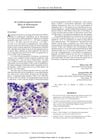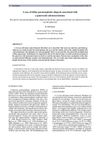 26 citations,
October 1978 in “JAMA”
26 citations,
October 1978 in “JAMA” Minoxidil helps treat severe high blood pressure.
 August 2024 in “Frontiers in Public Health”
August 2024 in “Frontiers in Public Health” Alopecia Areata severely impacts mental health, causing anxiety and depression, affecting quality of life.
 21 citations,
January 1988 in “Stress Medicine”
21 citations,
January 1988 in “Stress Medicine” Stress affects skin health and emotional well-being should be considered in skin disease treatment.
 3 citations,
October 1982 in “Postgraduate Medicine”
3 citations,
October 1982 in “Postgraduate Medicine” Most types of hair loss can regrow naturally, but there are no effective cures for male pattern or age-related hair loss, and only limited options for females.
8 citations,
February 2022 in “Frontiers in Medicine” COVID-19 may trigger severe skin flare-ups in people with autoimmune conditions like lupus.
 October 2022 in “International journal of research and review”
October 2022 in “International journal of research and review” A man had severe stomach issues after a dental treatment with Formacresol, which improved with a different medication.
 March 2014 in “Hair transplant forum international”
March 2014 in “Hair transplant forum international” Hair transplant surgeons should also focus on their patients' overall health, including regular check-ups and screening for common health issues.
 January 2021 in “Clinical case studies and reports”
January 2021 in “Clinical case studies and reports” A man had nail and hair changes months after severe Covid-19, showing long-term effects.
 July 2022 in “International journal of dermatology, venereology and leprosy sciences”
July 2022 in “International journal of dermatology, venereology and leprosy sciences” More frequent and severe skin problems are linked to higher daily alcohol consumption.
 4 citations,
April 2022 in “Dermatologic Therapy”
4 citations,
April 2022 in “Dermatologic Therapy” Injecting scalp tissue micrografts is a safe and effective treatment for hair loss after COVID-19.
5 citations,
January 2015 in “Case reports in medicine” A baby was diagnosed with IFAP syndrome due to a new genetic mutation, showing severe skin and developmental issues.
 8 citations,
August 1997 in “Australasian Journal of Dermatology”
8 citations,
August 1997 in “Australasian Journal of Dermatology” Most HIV patients develop skin symptoms that can indicate the stage of their disease.
 10 citations,
April 1976 in “Archives of Dermatology”
10 citations,
April 1976 in “Archives of Dermatology” A woman's significant hair loss was linked to rapid weight loss and hormone injections.
 1 citations,
April 1976 in “Archives of Dermatology”
1 citations,
April 1976 in “Archives of Dermatology” Sudden weight loss can cause significant hair loss, and using colchicine on the skin for psoriasis may be unsafe.
 1 citations,
October 2018 in “Infectious diseases in clinical practice”
1 citations,
October 2018 in “Infectious diseases in clinical practice” Azithromycin can rarely cause a severe drop in white blood cells.
 January 2023 in “Malaysian Journal of Medical Research”
January 2023 in “Malaysian Journal of Medical Research” Early and proper treatment is crucial for children with allergic conjunctivitis to avoid complications.
 1 citations,
December 2021 in “JAAD case reports”
1 citations,
December 2021 in “JAAD case reports” A woman with severe hair loss saw significant hair regrowth after adding platelet-rich plasma injections to her treatment with tofacitinib.
 May 2022 in “Acta Scientific Women's Health”
May 2022 in “Acta Scientific Women's Health” A woman lost over 80% of her hair due to a condition called telogen effluvium after having COVID-19.
 July 2021 in “Journal of emerging technologies and innovative research”
July 2021 in “Journal of emerging technologies and innovative research” Ayurvedic methods successfully treated severe acne in a patient.
 4 citations,
January 2019 in “Einstein (São Paulo)”
4 citations,
January 2019 in “Einstein (São Paulo)” Dupilumab improved severe atopic dermatitis in a patient who didn't respond to other treatments.
 4 citations,
July 2015 in “Journal of Feline Medicine and Surgery Open Reports”
4 citations,
July 2015 in “Journal of Feline Medicine and Surgery Open Reports” A cat with hair loss and illness was found to have cancer spread from its colon.
 54 citations,
February 1986 in “Archives of Dermatology”
54 citations,
February 1986 in “Archives of Dermatology” Higher minoxidil concentration (5%) works better for severe hair loss, with most patients seeing regrowth in 48-60 weeks.
 77 citations,
January 1989 in “Clinical Infectious Diseases”
77 citations,
January 1989 in “Clinical Infectious Diseases” Toxic Shock Syndrome progresses quickly, often involves multiple organs, and is linked to Staphylococcus aureus toxins, with treatment options available but diagnostic challenges remaining.
 6 citations,
May 2022 in “Journal of Infection”
6 citations,
May 2022 in “Journal of Infection” Long-COVID symptoms can last more than a year and change over time.
 54 citations,
June 1990 in “Journal of The American Academy of Dermatology”
54 citations,
June 1990 in “Journal of The American Academy of Dermatology” HIV can cause various severe or unusual skin conditions that help indicate the presence and stage of the disease.
 February 2008 in “Vlaams dierengeneeskundig tijdschrift”
February 2008 in “Vlaams dierengeneeskundig tijdschrift” A cat's hair loss was linked to a severe pancreatic cancer.
 October 2023 in “CHEST Journal”
October 2023 in “CHEST Journal” Early recognition and treatment of severe SLE symptoms can improve outcomes.
3 citations,
June 2018 in “Internal Medicine” Recombinant thrombomodulin can effectively treat severe complications in Cronkhite-Canada syndrome.
 50 citations,
October 1986 in “European journal of pediatrics”
50 citations,
October 1986 in “European journal of pediatrics” A boy with severe Vitamin D-resistant rickets did not respond to treatment and lacked a common symptom, suggesting a need for alternative treatments.
 2 citations,
March 2023 in “The Lancet. Respiratory medicine”
2 citations,
March 2023 in “The Lancet. Respiratory medicine” Long COVID is a serious, long-lasting illness that needs more recognition and support.



























